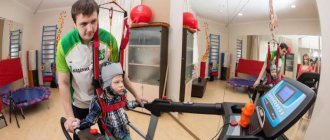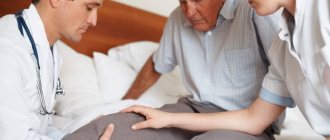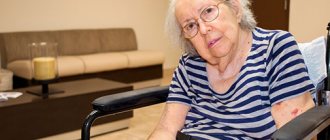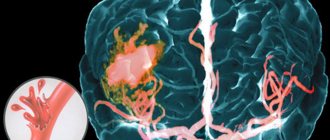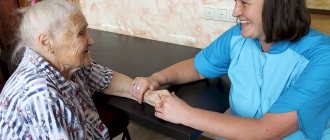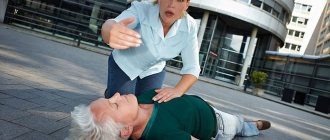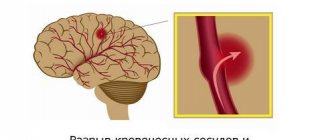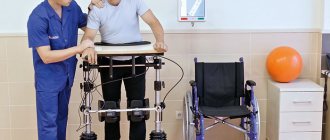Often people face such a problem that their elderly relatives have a stroke. This term refers to a violation of cerebral circulation, which leads to restrictions on the patient’s activities. When doctors make this diagnosis, the patient is forced to spend the first time in the hospital, and after discharge he needs special care at home.
To speed up the recovery of the body. There are two types of stroke: ischemic and hemorrhagic. In the first case, the patient’s recovery is much faster, but caring for the patient after a stroke falls entirely on the shoulders of his relatives. Such diseases carry serious complications for the patient’s body, so the process of care is a difficult task even for the closest people. The article provides basic recommendations for caring for such patients.
Basic rules of patient care
If a person has suffered a stroke, they will need quality care, especially if the person is paralyzed. At the same time, the most difficult thing in the process of caring for a patient is not so much the procedures themselves, but the need to preserve one’s own life. There are often cases when relatives of such patients cannot withstand the stress that has fallen on them and can fall into a long depression. This condition affects the well-being of everyone around, not just the patient.
Usually the attending physician gives a number of recommendations that allow you to organize proper care for the patient, even in a paralyzed state. Each case is individual and requires a specific approach. For some, helping with exercise, washing clothes, and preparing meals is enough. However, there are also severe cases when a person remains paralyzed; in such situations it is necessary to wash the patient, spoon-feed, give water and provide careful care. Everything can be complicated by the patient's recumbent regime when he is bedridden, but even in this case one must not give in to despair. You need to mentally prepare for the fact that the rehabilitation period for the patient will be difficult, and you must not forget about your own life. Experts identify several main tasks that need to be performed in the process of caring for a patient at home:
- Make sure that bedsores do not form;
- Protect the patient’s body from pneumonia;
- Help normalize digestion;
- Carry out preventive measures to prevent thrombosis;
- Prevention of relapse.
These tasks must be performed on a regular basis. Below in the article detailed descriptions of each direction will be given. At the same time, recommendations are given on how not to complicate your life and not fall into a state of depression, even if a person has to take care of a patient after a stroke. Such work requires strength and energy, which should be enough for one’s own life.
Prevention of bedsores
Paralyzed people most often face the problem of bedsores, since the bedridden lifestyle of patients after a stroke contributes to the emergence of this problem. Usually they can occur in areas where there is too much pressure on the body, for this reason metabolic processes can be disrupted, and tissues die and rotting occurs. The back, shoulder blades, tailbone and elbows are most susceptible to the formation of bedsores.
Current prices for anti-decubitus mattresses and medical products for the home follow the link.
More details
We recommend
Such injuries are a consequence of improper care of the patient after a stroke. Bedsores can appear if the patient is not turned over, and he lies most of the time in the same position. If the patient is paralyzed, then he cannot move on his own, which accelerates tissue necrosis; this situation can cause death. At the same time, bedsores are a serious source of infection that spreads throughout the human body. To prevent the appearance of such wounds in a patient, the following preventive measures must be taken:
- If a person is dealing with a paralyzed patient, then periodically it is necessary to independently change the position of his body; the patient will not be able to do this on his own;
- A mandatory examination of the patient’s skin condition is necessary;
- It is better to use a mattress made of special fabrics, which will protect the patient from the formation of bedsores;
- For prevention, pillows and rubber circles are also used;
- Doctors usually give recommendations for massage, which must also be followed;
- The body must be constantly treated with antiseptic hygiene products;
- It is recommended to check that there are no folds or unnecessary objects under the patient’s body.
If the process of caring for the patient is properly organized, and the body is constantly treated with an antiseptic, then dangerous infections will not appear on the body and the chances of a quick recovery will increase significantly. Lying down is not a reason to give up and give up; partial recovery is still possible. The main thing is to take timely measures for rehabilitation: with proper care for the patient after a stroke, the ability to walk and care for oneself can be restored.
Skin problems when immobile
When lying down, the skin is exposed to significant impact from friction against linen, from compression between the tissues of the human body (muscles, bones, etc.) and the surface of the mattress, from crumbs, folds of linen, from sweat, urine and much more. Patients may experience diaper rash, bedsores, scratching, and excessive dryness or moisture in the skin. The skin becomes more sensitive to the ambient temperature; bedridden patients often feel chilly and do not tolerate room ventilation or changing underwear and bed linen.
Prevention consists of frequent and regular hygienic treatment of the skin of the human body, and the selection of warm, light, well-breathable clothing that does not cause sweating.
Prevention of pneumonia
In addition to the problem of bedsores, a patient after a stroke may face a number of other problems. If the blood in the lungs periodically stagnates, then the risk of pneumonia is high. This result may lead to disruption of the respiratory system. Usually, with proper care after a stroke, the risk of developing pneumonia can be prevented.
Preventive measures are the best option for the patient, since preventing the disease will be much more difficult. The therapy itself is more difficult, and in some cases even the strongest antibiotics will not help. When pneumonia occurs, there is a high risk of death for the patient.
The list of preventive measures to combat pneumonia includes the following:
- Periodically, it is necessary to conduct vibration massage sessions to treat the patient’s chest;
- Make sure that the patient takes medications prescribed by the doctor to remove mucus from the body;
- Carry out breathing exercises and gymnastics with the patient (you can simply inflate balloons, blow into a glass of water through a straw and other ordinary actions);
The steps themselves are quite simple, and they help prevent the development of pneumonia.
Respiratory organs in bedridden patients
In a horizontal position, the volume of the lungs when inhaling air decreases compared to a vertical position. The lack of active movements and a decrease in the volume of pulmonary ventilation leads to a decrease in blood flow and congestion in the lung tissue. The sputum becomes viscous and difficult to cough up. It accumulates in the airways and increases congestion in the lungs. All this leads to the development of an infectious-inflammatory process in the pulmonary system. Prevention consists of active movements of the patient in bed and breathing exercises.
Proper functioning of the digestive system
Usually, if a person is in a paralyzed position, relatives provide food and drink to the patient. In this case, food plays an important role, since the intestines and stomach must work well for a quick recovery of the patient. However, a stroke often leads to disruption of the digestive system; in order to restore its functioning, it is necessary to ensure that the body receives a large amount of fiber.
It can be purchased in stores and pharmacies in its pure form and during the process of caring for a patient after a stroke, add it to food and drinks. A prerequisite for caring for a patient after a stroke is to ensure a calm environment during the feeding process. Doctors recommend covering the patient with pillows so that the patient does not spend a lot of effort getting up. It is also better to include liquid foods or pureed foods in your diet. A blender will help in this difficult task.
Problems with the gastrointestinal tract
The lack of active movements when lying down leads to a decrease in the tone of the gastrointestinal tract, especially the colon, which in turn leads to constipation or difficult bowel movements. Bedridden patients are forced to defecate in an unusual and difficult position, often in the presence of strangers. This helps suppress the urge to defecate. Some patients arbitrarily delay defecation because they are embarrassed to seek help from strangers. Constipation and sluggishness of the gastrointestinal tract can lead to indigestion, which is usually expressed initially in a coated tongue, bad breath, lack of appetite, and mild nausea. Fecal intoxication develops. Often constipation is replaced by diarrhea. After a few months of lying down, the gastrointestinal tract becomes very susceptible to changes in diet and infection, i.e. Such people develop digestive disorders faster than a person leading an active lifestyle.
Prevention of complications consists of creating comfortable conditions for physiological functions, exercising the anterior abdominal wall, and following an appropriate diet.
Blood clots
Another possible consequence of a stroke is the formation of blood clots in the body. The reason for their appearance is stagnant blood in the body if you lead a sedentary lifestyle. They can also cause blockage of blood vessels in the patient. To avoid blood clots, you must:
- Ensure that the patient after a stroke follows the doctor’s recommendations for physical exercise;
- Massage the limbs where there is a high risk of stagnation;
- Use compression stockings;
- As prescribed by the doctor, give the patient medications to thin the blood.
Be sure to follow your doctor's recommendations on medication dosage. Choosing medications on your own can only harm the patient.
Don't let your skin dry out!
Enhanced keratization and epithelization of the skin is one of the physiological mechanisms in bedridden patients. You can avoid it by following these steps:
If you cannot take a full bath or shower, you can do the following:
This is a dry bathing option that will replace a full bath. After the procedures, be sure to smear your entire body with lotion, paying special attention to your back and legs. Massage movements will help increase blood flow, and the skin will breathe easier, and hypoxia will disappear.
Relapse prevention measures
If the patient has experienced a stroke once, then there is a high probability that the attack may recur. That is why initial relapse prevention is carried out in the clinic, but it must be supported by measures at home:
- It is necessary to ensure that the patient performs physical exercises, as well as periodically massage the limbs;
- Eliminate stress for the patient and avoid heavy loads;
- Monitor the correct dosage of medications;
- Follow all doctor's recommendations;
- Periodically check the patient’s well-being and measure his blood pressure; if, when caring for a patient after a stroke, his condition worsens, it is recommended to consult a specialist.
- Make sure that the patient gives up bad habits.
The patient’s condition also plays a big role; he should not feel like a burden to his relatives. It is for this that it is necessary to find the line between caring for the patient and one’s own personal life; completely giving oneself to another person will not benefit anyone.
Doctor's assessment
Is it necessary to tell the whole truth to relatives whose family has a bedridden patient before death? What are the signs of this condition?
There are situations when the family of a terminally ill patient, being unaware of his condition, literally spends their last savings in the hope of changing the situation. But even the best and most optimistic treatment plan may not produce results. It may happen that the patient will never get back on his feet or return to an active life. All efforts will be in vain, expenses will be useless.
Relatives and friends of the patient, in order to provide care in the hope of a speedy recovery, quit their jobs and lose their source of income. Trying to alleviate the suffering, they put the family in a difficult financial situation. Relationship problems arise, unresolved conflicts due to lack of funds, legal issues - all this only aggravates the situation.
Knowing the symptoms of inevitably approaching death, seeing irreversible signs of physiological changes, an experienced doctor is obliged to inform the patient’s family about this. Aware, understanding the inevitability of the outcome, they will be able to focus on providing him with psychological and spiritual support.
Recommendations for caring for patients after a stroke
Caring for a patient after a stroke is a difficult task, which primarily affects the psychological state of loved ones. That is why, in addition to recommendations for care, it is necessary to listen to advice on how to normalize your life so as not to fall into premature depression.
- Communicate with people in a similar situation. There are a large number of forums on the Internet for people who are in a similar situation. If you need to speak out, you can talk to those who have encountered similar problems, so you can find support and realize that this is not a punishment, but a problem that needs to be solved.
- Fatigue is a normal state. There is no need to convince yourself that fatigue is a bad state. Since the process of caring for a patient after a stroke is hard work, it is natural that loved ones get tired of it from time to time. Therefore, you should not forget about rest.
- It is necessary to take breaks periodically. You definitely need to give yourself a break for at least 30 minutes every 4 hours. There are situations when paralyzed patients need constant care, but you must leave 30 minutes of time for your own rest.
- You need to please yourself at least once a day. It is also necessary to find some time for hobbies or activities that bring true pleasure. A change in activity will prevent depression, which negatively affects not only the condition of the person himself, but also the patient.
- Allowed to give vent to negative emotions. Every person has the right to feel anger and resentment, but this does not mean that you need to start scandals with relatives. It’s better to go outside, cool down and try to think rationally about the problem. It must be remembered that a person can be capricious because of his illness, and not on purpose.
- Be sure to ask for help. One person cannot take upon himself all the care of a loved one; he simply cannot stand it. Therefore, you should not be embarrassed to ask for help and small favors.
- You can also turn to specialists for help. The rehabilitation process is not only about regular exercise and proper nutrition. In some cases, you may need the help of a specialist; for this, patients after a stroke may be referred to special rehabilitation centers. There, professional doctors and nurses will be able to provide them with the necessary assistance, and relatives will be relieved of part of the burden of caring for a patient after a stroke. Typically, such rehabilitation takes no more than two weeks: the patient will receive qualified assistance, and relatives will be able to take a short break from their troubles.
- Constant communication with the patient is necessary. An honest conversation is the best way to resolve any situation. Sometimes it is enough to talk to the patient for him to understand that he is not indifferent. Sometimes simple human communication is enough for the patient to feel much better; however, in such conversations it is recommended not to discuss the disease. You can talk about unrelated topics, tell an anecdote and raise the morale of the patient.
- You also need to take care of your own health. Sometimes a person is so immersed in caring for another that he forgets to eat and sleep normally, and also completely refuses to communicate with friends. This daily routine can have a negative impact on a person’s health, but he will not even notice the deterioration of his own health. That is why it is necessary to monitor your own diet, as well as take more vitamins.
The process of caring for patients after a stroke can be an overwhelming burden for one person. However, this responsibility cannot be completely abandoned. Relatives are responsible for the recovery of the patient, as well as how long he can live after such a serious attack. It may not always be possible to return the patient to normal daily life, but with proper care, significant improvements in health can be achieved. But we shouldn’t forget about ourselves: the psychological state of the person caring for the patient can influence the recovery process and their own well-being.
How to ease the suffering of a dying person
Bedridden patients, people after a stroke, injury or with cancer most often experience severe pain. To block these near-death sensations, the attending physician prescribes strong painkillers. Many painkillers can only be purchased with a prescription (for example, Morphine). To prevent dependence on these drugs, it is necessary to constantly monitor the patient’s condition and change the dosage or stop taking the drug if improvement occurs.
A dying person who is of sound mind has a great need for communication. It is important to treat the patient’s requests with understanding, even if they seem ridiculous.
care problemsHow long can a bedridden patient live? No doctor will give an exact answer to this question. A relative or guardian caring for a bedridden patient needs to be with him around the clock. For better care and relief of the patient’s suffering, special means should be used - beds, mattresses, diapers. To distract the patient, you can place a TV, radio or laptop next to his bed; it is also worth getting a pet (cat, fish).
Most often, relatives, having learned that their relative needs constant care, refuse it. Such bedridden patients end up in nursing homes and hospitals, where all care problems fall on the shoulders of the workers of these institutions. Such an attitude towards a dying person not only leads to his apathy, aggression and isolation, but also aggravates his health. In medical institutions and boarding houses, there are certain standards of care, for example, each patient is allocated a certain amount of disposable products (diapers, nappies), and bedridden patients are practically deprived of communication.
When caring for a bedridden relative, it is important to choose an effective method of alleviating suffering, provide him with everything he needs and constantly worry about his well-being. Only in this way can his mental and physical torment be reduced, as well as prepare for his inevitable death. You cannot decide everything for a person; it is important to ask his opinion about what is happening, to provide a choice in certain actions. In some cases, when there are only a few days left to live, it is possible to discontinue a number of heavy medications that cause inconvenience to a bedridden patient (antibiotics, diuretics, complex vitamin complexes, laxatives and hormonal agents). It is necessary to leave only those medications and tranquilizers that relieve pain and prevent the occurrence of convulsions and vomiting.


